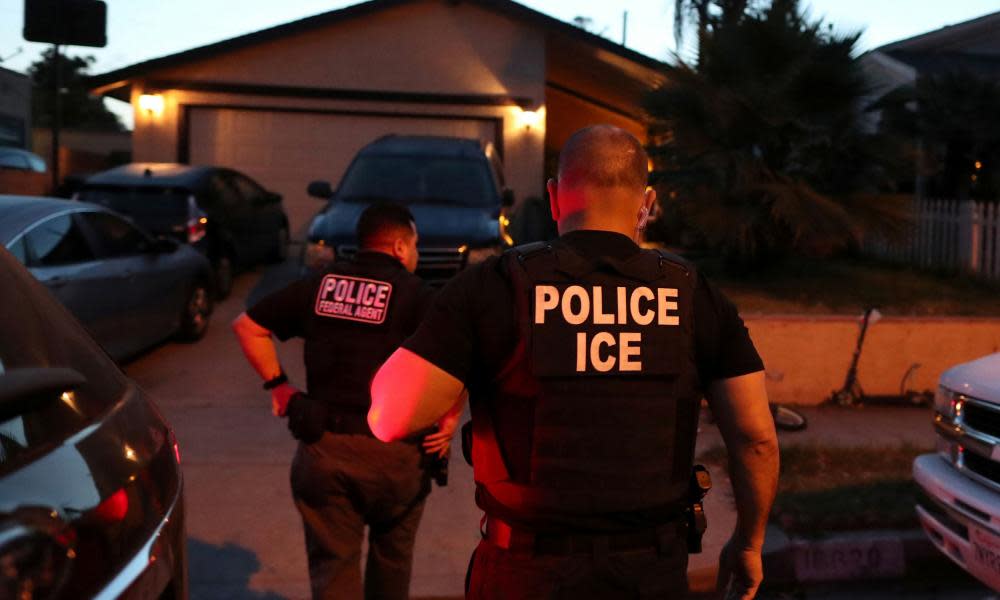California lawmakers push to stop deportations and end jail transfers to Ice

California lawmakers are fighting to protect thousands of residents from deportation with new legislation that would stop state prisons and jails from handing over immigrants to US Immigration and Customs Enforcement (Ice).
California’s controversial practice of coordinating with Ice agents has received widespread scrutiny in past months, including after the Guardian revealed that the state had transferred two immigrant prisoners to Ice for deportation after they had served as incarcerated firefighters on the frontlines – and after they had completed their sentences.
Kao Saelee, 41, was scheduled to leave prison after 22 years behind bars in August. But on the day of his release, when his sister was waiting to take him home, California instead handed him over to immigration authorities. He remains in Ice custody in Louisiana. Bounchan Keola, 39, was reported to Ice by California prison officials in October.
Both men had served the state as firefighters while in prison and both were threatened with deportation to Laos, a country their families had fled as refugees when they were young children. The two had been locked up since they were teenagers.
Assembly member Wendy Carrillo, of Los Angeles, and other lawmakers on Wednesday unveiled legislation that would ensure that immigrant community members eligible for release from state jails or prisons would not be sent to Ice, but instead would be able to re-enter society and reunite with their families.
Supporters of Assembly Bill 937, the Voiding Inequality and Seeking Inclusion for Our Immigrant Neighbors (Vision) Act, say that the practice of transferring people from prison to Ice was a cruel form of “double punishment” that indefinitely separated people from their loved ones after they have served their time. “If it wasn’t for where they were born, these Californians would be able to return home,” Carrillo said.
California has no legal obligation to report prisoners to Ice, and despite intense backlash last year, Gavin Newsom, the state’s Democratic governor, has defended the policy and allowed the voluntary transfers to continue. The transfers can affect undocumented people and legal permanent residents, who lose their green cards once they are in Ice custody, due to their criminal records.
California has a “sanctuary law”, which means local law enforcement is not supposed to collaborate with US immigration and has a mandate to shield immigrants from deportation threats, but the state has made an exception for local jails and prisons.
The transfers are one of the key drivers of deportation in the state. The California department of corrections and rehabilitation (CDCR) transferred an estimated 1,400 people from its custody to Ice last year, according to the Asian Law Caucus, a legal advocacy group supporting the bill. In 2018 and 2019, local jails sent more than 3,700 people to Ice.
The practice has been especially concerning during the pandemic when Ice jails and CDCR prisons have both suffered massive and deadly Covid-19 outbreaks in their overcrowded facilities.
Keola, who suffered a near-death injury fighting wildfires last year, was freed from Ice custody in January and reunited with his family in the Bay Area for the first time in decades. But the threat of deportation still looms.
“I want to get on my feet and work and advocate and help people like myself,” Keola told the Guardian after his release, saying he was hoping to start working as a firefighter. “We should all have that opportunity to have that American life. Hopefully Newsom will stop turning over people like myself.”
Last week, Bounchan Keola walked free after 22 years behind bars. He was an incarcerated firefighter who California sent to US immigration at the end of his sentence last year.
I chatted with Boun + his sister Thong about reuniting after decades apart.
LISTEN: (thread) pic.twitter.com/8E9oJY0x0L— Sam Levin (@SamTLevin) February 7, 2021
On Wednesday, Keola spoke at a news conference supporting the bill, urging the governor to also issue pardons to him and Saelee, the other jailed firefighter sent to Ice, so that they would no longer be threatened with deportation due to their criminal records. “At any moment, I could be arrested and be deported to Laos, a country I have no ties to.”
Spokespeople for Ice and CDCR declined to comment.

